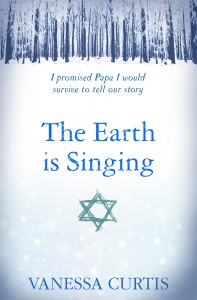The Earth is Singing: An Interview with Vanessa Curtis
by Elizabeth Hawksley
 As a contemporary YA and children’s book author, Vanessa Curtis has won the Manchester Children’s Book Award and been short-listed for the Waterstones Children’s Book prize, but The Earth is Singing is her first historical novel.
As a contemporary YA and children’s book author, Vanessa Curtis has won the Manchester Children’s Book Award and been short-listed for the Waterstones Children’s Book prize, but The Earth is Singing is her first historical novel.
Set in Riga, the capital of Latvia, the novel opens with the Nazi invasion in 1941. The heroine, Hanna, age fifteen, is Jewish. She is training to be a dancer, but the Nazis have other plans for Jews.
EH: What drew you to this story?
VC: I’ve always been aware of my Jewish heritage, but I never knew that my mother’s family came from Latvia. Although my mother’s grandmother had fled to Britain in 1905, I began thinking about the friends and relatives she left behind her and their eventual fate during World War Two.
When I researched what had happened to the Jews in Riga, I was horrified to learn that the Nazis had wiped out the entire Jewish population within two weeks in early winter, 1941. The Earth is Singing came from that.
EH: This is your first historical novel. How difficult did you find writing about a different time, place and mind-set?
VC: I found it a very enjoyable challenge, although it did take a lot of planning and researching. I had lists pinned up over my desk at all times: place names and street names in Riga; a calendar of dates from 1941; recipes for Jewish food; dates of key Jewish festivals; and a chronological timeline of events in Riga between June and December 1941. It was a lot of information to juggle with, but eventually it all fell into place.
EH: I am interested in how you found a voice for Hanna. What made you choose the first person and the present tense?
VC: I’m always happier writing in the first person present tense. It allows an immediacy which works well in novels for young adults and I’ve used it in all my novels for children. The present tense adds the sense that events are happening just as Hanna witnesses them.
EH: There is an interesting paradox. Somehow, Hanna continues to make choices, however small, in a situation which allows her, as a Jew, no choice at all. How important is choice in the novel?
VC: Very important. Even being able to make small choices gives Hanna a sense that she still has an identity and might survive. Of course, some of the choices she makes, along with her mother, lead to disaster and tragedy but little choices, such as hiding food or selling jewellery, were essential if Jews wanted to eat. When her grandmother is gone and her mother ill, Hanna has to make the sorts of choices normally reserved for adults.
EH: Why does Hanna continue to have faith that her father is alive? The readers may guess that he probably isn’t, but, of course, we could be wrong.
VC: I think that hope of her father’s survival is what helps her through traumatic situations and enables her to look out for her family. It also gives her hope for a better life after the war.
EH: I really enjoyed The Earth is Singing; will there be a sequel? I’m sure that many readers will want to know what happened next.
VC: I always intended the novel as a complete thing in itself, which tells one story in detail and then provides an ending which readers can interpret in any way they like. I don’t think the story would lend itself to a sequel, but I have planned another novel with a storyline which is not entirely unconnected. It takes place in 1950s Munich and tells the story of what happened to the Polish children who were stolen by the Nazis and passed off as Aryans. So my research is taking me down some similar avenues.
The Earth is Singing is published by Usborne, and reviewed in the Children & Young Adult section of this issue of HNR. For more details on the author, visit www.curtisliterary.co.uk and www.usborne.com
About the contributor: Elizabeth Hawksley has been an avid reader of historical novels since childhood, and joined the HNS on its inception. She has had twelve historical novels published.
______________________________________________
Published in Historical Novels Review | Issue 72, May 2015






